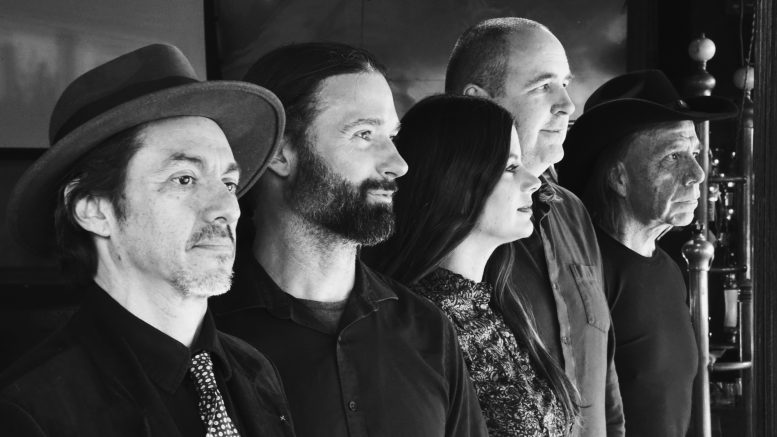By Casey Rafter
The brush strokes capture a woman throwing her head back in a mess of wet hair and abandon, her mouth opening in what might be an untamed cackle or a passionate cry of ecstasy.
In either case, what Spanish painter Joan Lalucat conjured when framing this wild woman is a moment of triumph.
Lalucat’s original painting graces the cover of Katie Knipp’s new album “Me,” a song collection that itself is a triumph in the way it explores new territory and stretches into genres beyond Knipp’s native blues stylings. It also features some of Sacramento’s most celebrated musical players.
Knipp officially launches the record this Saturday at Harlow’s. The show, which starts at 3 p.m., will feature appearances from mighty blues champion Mick Martin, City of Trees guitar sensation Quinn Hedges and the always fiery Peligro Brass band.
“Me” has been Knipp’s most-ambitious project to date. It’s her first album to receive the vinyl treatment, so quite literally the largest album in size, though the bigger picture for the songstress is her creative attitude. Knipp says that in previous studio work, she’d been distracted by the notion she needed to prove herself.
This time, Knipp took a “give no Fs” approach.
“It’s a total rebirth,” Knipp reflected. “Now it was just 100% – ‘Let’s make this piece of art.’ ‘Let’s be really ugly sometimes’ … It’s all for the sake of the song. I feel like, finally, after all these records, I’ve turned a corner here in my womanhood as an artist.”
Martin has been a supporter of Knipp for years, long before he played on her 2021 EP “The Well.” In this new go-around, Martin brings his harmonica to Knipp’s composition “Outlaw Doc,” sharing the spotlight with her doboro bends and the twang-savage licks from guitarist Chris Martinez. The track tells the story of a murderous former physician named Tom Bell who, in the 1850s, wreaked havoc in central California until he was caught and hung by sheriff deputies east of Fresno.
“Katie’s got great ears, and she knows what she wants, and she also knows how to chisel it out of you,” Martin notes of Knipp’s ability to steer the ship. “It’s always been nice because she too appreciates originality…She likes the personality of the people she works with. That is part of what makes it so wonderful.”

To produce the album, Knipp enlisted her bassist Pancho Tomaselli — who shares that role in her band with bassist Jen Rund. Tomaselli has decades of experience as a worker of low-end magic, having acted as War’s musical director and played with Tower of Power, not to mention being in his own band with former Slayer drummer Dave Lombardo and vocalist Gerry Nestler.
Tomaselli plays throughout the album, alternatively providing bass, guitar and vocals. He initially connected with Knipp when a friend couldn’t work a gig subbing-in for her bass player in 2023. Tomaselli, who was freshly returning to the Sacramento scene after years in L.A., snagged the opportunity and then witnessed the way Knipp performs live –a sight he now understands knocks the roof off venues across the region.
“When I saw Katie performing, it’s completely different than when you hear a recording, I was mind-blown,” Tomaselli admits. “Her career is about to bloom and blow up. She’s matured incredibly as an artist from the first album she did. And now you can tell that she’s not done.”
Tomaselli calls Knipp a mature, empowered woman. And this reviewer believes that same inner power gets flexed on every track of “Me” through stories of cheating, robbery, tragedy and self-discovery.
“Women on TV call themselves empowered just because they open their legs at the Grammys,” Tomaselli argues. “Katie’s a mom with a whole mom job, but a whole artist job on the side.”
For the track “Go,” Knipp wrote a seven-part harmony. Though she doubled her voice for most of those tracks, Tomaselli pitched in to sing backup for the lowest register. On that track, Sacramento horn aficionados Justin and Brandon Au and Danny “Sax” Sandoval blast their signature onto the album.
The song “The Devil’s Armchair” invokes the image of a device that appears to provide comfort, but has a nefarious hidden agenda. Knipp said the song is about addiction in its many forms — love, substance or doom-scrolling.
“It’s centered around comforts not necessarily being comfortable,” Knipp explains. “When you sink into an armchair and get real comfortable — I had this imagery of the devil wrapping his arms around me as I did whatever thing that I probably shouldn’t have been doing.”
That song also carries with it an intentional Chicano influence that both Tomaselli and Knipp were deliberate about, with some back-up from Peligro Brass.
“I’m not Mexican, right? I’m like 80% Irish; however I’ve lived in California my entire life and this is what California sounds like to me,” Knipp points out. “I knew I wanted Peligro Brass to add to that vibe. Then, in the studio, Pancho and Sam Miranda started singing in Spanish, and I said, ‘Get on the mic’s guys let’s do this bridge.’”

Another of the album’s tracks, “Dirty Cables,” Knipp draws from a tragic moment of personal loss, the death of her high school friend Josh Dadami, who lost his battle with cystic fibrosis the night she was performing at a bar for a tiny crowd of two people — a fact that weighed heavily on her for years before she was able to process it in a song.
“I saw on my phone a missed call from his mom and I checked the voicemail when I was done with the gig,” Knipp began. “I called her back that next morning at eight o’clock and she told me he had passed away. He was only 26, and I felt so guilty. It was a lifetime for me to write those words. I can’t even count the number of retakes I had to do because I kept falling apart.”
Other tracks on “Me” have a different feel. In the case of “Lava Pot,” it’s one that even David Lynch might appreciate for a scene in “Twin Peaks.” Knipp hopes it might wind up in some movie scene with a strip club. The song’s vibe easily calls for such imagery.
The album’s last track, “Stillness,” returns to the somber tones that Knipp flirted with in other parts of the album. A San Bernadino shop owner, Laurie Carlton, was shot and killed by a man spouting homophobic slurs at her for selling Pride flags in her store. Knipp said that reading about Carlton’s death in the news hit her so hard that she had to process it through song-writing.
“I was shaking with anger and sadness,” Knipp recalls. “It was also a full-circle thing about some people I know being changed for the worse by politics and feeling like, for some reason, they have a path to be racist or anti-LGBTQ. It just shook me to my core. This woman has been married for decades and has nine kids. She was simply trying to support her community, and this is what it’s come to.”
She adds, “It’s also from the perspective of the cop who chased him down, got in a gun battle with him, and killed him – and the quiet right after.”



Be the first to comment on "Fearless in darkness, fearless in light: Katie Knipp’s ‘Me’ plumbs the depths of struggle "